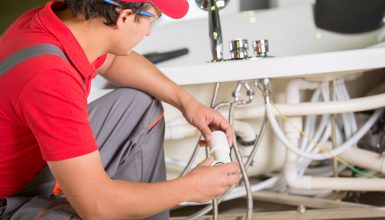An Handbook to Rectifying Low Water Pressure in Your Home
An Handbook to Rectifying Low Water Pressure in Your Home
Blog Article
Almost everyone may have their own unique theory when it comes to 9 Reasons for Low Water Pressure in Your House.

Low water stress in your house can be an aggravating issue, influencing whatever from bathing to cleaning dishes. If you're experiencing weak water circulation, there are several feasible causes and solutions to check out. In this overview, we'll review common reasons for low tide pressure and useful actions to deal with the problem successfully.
Intro to Low Water Stress
Low water pressure takes place when the circulation of water from your faucets, showers, and various other components is weaker than usual. This can make day-to-day tasks much more tough and much less efficient. Recognizing the reasons for low water pressure is critical to finding the ideal option.
Usual Causes of Low Tide Pressure
Faulty Pressure Regulators
Pressure regulatory authorities are accountable for maintaining constant water stress in your house. If they malfunction, it can result in low water pressure or uneven circulation throughout your house.
Municipal Water System Issues
Sometimes, the issue lies outside your home. Municipal water concerns, such as main line leaks or maintenance work, can temporarily decrease water stress in your area.
Pipeline Obstructions
In time, pipes can become clogged with mineral deposits, sediment, or debris, restricting the circulation of water. This is an usual issue in older homes with galvanized steel pipes.
Corrosion
Deterioration within pipelines can lead to leakages and minimized water pressure. Rust accumulation can restrict water circulation, particularly in aging plumbing systems.
Just How to Diagnose Low Tide Pressure
Checking Pipes
Check visible pipelines for indications of leakages, rust, or blockages. Take notice of any kind of unusual noises, such as knocking or rattling pipelines, which could show concerns within the plumbing system.
Consulting with a Plumber
If you're unable to identify the reason for low water stress, think about hiring an expert plumber to conduct a complete assessment. They can identify underlying problems and suggest ideal remedies.
Examining Taps and Fixtures
Begin by checking the water pressure at various faucets and components throughout your home. If the issue is isolated to specific areas, it may suggest localized troubles.
Do It Yourself Solutions to Repair Low Water Stress
Flushing Water Heater
Sediment accumulation in the hot water heater can restrict flow and decrease performance. Purging the storage tank occasionally helps eliminate sediment and preserve optimum efficiency.
Inspecting Stress Regulator
Make certain that the pressure regulatory authority is operating correctly. Adjusting or changing the regulatory authority can assist bring back proper water pressure throughout your home.
Cleansing Aerators and Showerheads
Mineral deposits can build up in aerators and showerheads, minimizing water flow. Get rid of and clean up these components regularly to boost water stress.
Cleaning Clogs in Water Lines
For minor clogs, attempt utilizing a plumbing snake or chemical drainpipe cleaner to clear obstructions in pipes. Be cautious when using chemicals and comply with security standards.
When to Call an Expert Plumber
If do it yourself efforts stop working to resolve the issue or if you believe considerable plumbing problems, it's ideal to look for assistance from a qualified plumber. They have the expertise and devices to address complicated problems safely and effectively.
Preventive Measures to Keep Water Stress
Mounting a Stress Booster
Consider setting up a stress booster pump to improve water pressure in areas with continually reduced circulation. This can be especially beneficial for multi-story homes or homes with high-demand components.
Surveillance Water Use
Bear in mind water usage routines and stay clear of overtaxing the plumbing system. Simple modifications, such as shocking showers and laundry lots, can assist preserve adequate water stress.
Regular Maintenance
Set up regular upkeep for your plumbing system to stop concerns such as deterioration, leakages, and clogs. Dealing with small issues early can help prevent even more substantial repair work in the future.
Conclusion
Taking care of low water stress can be irritating, however determining the underlying causes and implementing appropriate remedies can bring back optimal flow throughout your home. Whether it's cleaning up aerators, checking pipelines, or consulting with a plumber, taking aggressive steps can make sure a stable supply of water for your everyday needs.
FOUR WAYS TO FIX LOW WATER PRESSURE NOW
Turning on a shower or faucet only to find the water comes out in a sad, slow drizzle is never a good feeling. How exactly are you supposed to wash a pan or take a quick shower when it takes 10 minutes just to rinse off a little soap? The good news is that when your water pressure is bad, there's always a cause: typically one that can be easily fixed. Here are some of the most common causes of low pressure and what you can do to fix the issue:
DEBRIS AND MINERAL DEPOSIT BUILDUPS
If you notice low water pressure from just one or two of the fixtures in your house, the problem likely has to do with debris buildup. Water is full of minerals and other debris, all of which can accumulate in your pipes and on your fixtures. This can cause a blockage that affects how much water flows through. To fix this, try filling a small plastic bag with white vinegar, and use a rubber band to hang it around your showerhead or faucet. Let the head of the fixture soak for a few hours, and the vinegar should loosen the deposits.
WATER LEAKS
Leaks are another common cause of low water pressure. If water is flowing out of your plumbing through a hole or crack before it can reach your fixture, the pressure coming out of the faucet or showerhead will be lower. A plumbing professional is your best bet for finding and repairing a leak in your water supply pipes.
Leaks are another common cause of low water pressure. If water is flowing out of your plumbing through a hole or crack before it can reach your fixture, the pressure coming out of the faucet or showerhead will be lower. A plumbing professional is your best bet for finding and repairing a leak in your water supply pipes.
A VALVE ISSUE
If you have low water pressure throughout your home, check your main shut-off valve to make sure it's completely open. You may also want to see if there's a pressure-reducing valve installed. If there is, have a plumber help you adjust the settings to get the pressure you're looking for.
OTHERS USING WATER
Believe it or not, your low water pressure could be caused by your neighbors. If you notice low pressure at certain times of day, it may be because you and the people living next to you have similar schedules - when everyone is showering at the same time, the pressure will be lower in every home. Low pressure throughout the neighborhood may also be caused by an issue with your municipal water supply. If that's the case, call the supplier to see if they're working on the issue.
https://www.rotorooter.com/blog/water-leaking/low-water-pressure-fixes/

I'm just very excited about 9 Reasons for Low Water Pressure in Your House and I am praying you liked the entire post. Sharing is nice. You never know, you may be doing someone a favor. I cherish reading our article about 4 Ways to Troubleshoot Low Water Pressure.
Phone Report this page